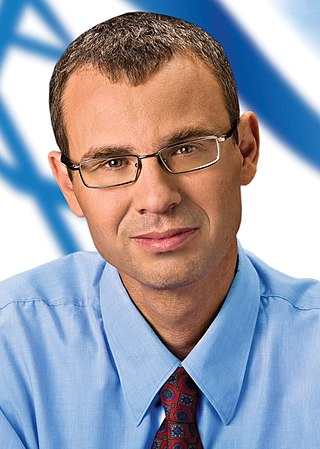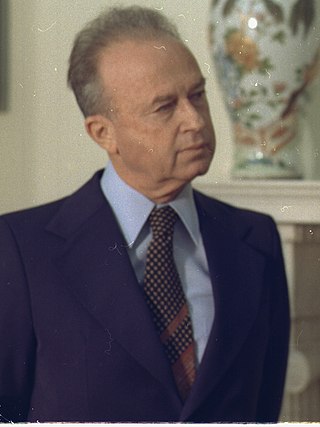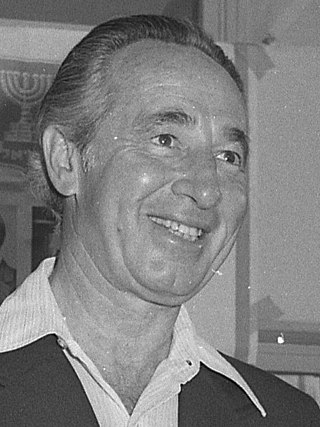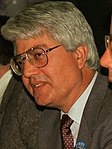
The prime minister of Israel is the head of government and chief executive of the State of Israel.

Yitzhak Rabin was an Israeli politician, statesman and general. He was the fifth prime minister of Israel, serving two terms in office, 1974–1977, and from 1992 until his assassination in 1995.

Shimon Peres was an Israeli politician and statesman who served as the eighth prime minister of Israel from 1984 to 1986 and from 1995 to 1996 and as the ninth president of Israel from 2007 to 2014. He was a member of twelve cabinets and represented five political parties in a political career spanning 70 years. Peres was elected to the Knesset in November 1959 and except for three months out of office in early 2006, served as a member of the Knesset continuously until he was elected president in 2007. Serving in the Knesset for 48 years, Peres is the longest serving member in the Knesset's history. At the time of his retirement from politics in 2014, he was the world's oldest head of state and was considered the last link to Israel's founding generation.

Yitzhak Shamir was an Israeli politician and the seventh prime minister of Israel, serving two terms. Before the establishment of the State of Israel, Shamir was a leader of the Zionist militant group Lehi, also known as the Stern Gang.

Likud, officially known as Likud – National Liberal Movement, is a major right-wing political party in Israel. It was founded in 1973 by Menachem Begin and Ariel Sharon in an alliance with several right-wing parties. Likud's landslide victory in the 1977 elections was a major turning point in the country's political history, marking the first time the left had lost power. In addition, it was the first time in Israel that a right-wing party received the most votes. After ruling the country for most of the 1980s, the party lost the Knesset election in 1992. Likud's candidate Benjamin Netanyahu won the vote for prime minister in 1996 and was given the task of forming a government after the 1996 elections following Yitzak Rabin's assassination. Netanyahu's government fell apart after a vote of no confidence, which led to elections being called in 1999 and Likud losing power to the One Israel coalition led by Ehud Barak.

David Levy was an Israeli politician who served as a member of the Knesset between 1969 and 2006. Levy's ascent to political prominence demonstrated the growing influence of Mizrahi Jews in Israel. He played a crucial role in changing the political power structure in Israel by motivating hundreds of thousands of Mizrahi voters to cast their ballots for Menachem Begin. To quote Benjamin Netanyahu, “David, born in Morocco, forged his way through life with his own two hands… On the national level, he made a personal mark on the political world, while taking care of weak populations that knew adversity.”

The deputies of the prime minister of Israel fall into four categories: Acting Prime Minister, Deputy Prime Minister, Vice Prime Minister and Alternate Prime Minister. Vice Prime Minister is an honorary and extra-constitutional position, but entitles the officeholder to a place in the cabinet. Deputy Prime Minister, Designated Acting Prime Minister, and Alternate Prime Minister are constitutional positions.

The Center Party, originally known as Israel in the Center, was a short-lived political party in Israel. Formed in 1999 by former Defense Minister Yitzhak Mordechai, the aim was to create a group of moderates to challenge Benjamin Netanyahu on the right and opposition leader Ehud Barak's Labor Party on the left.

Gesher, officially the Gesher National Social Movement, was a political party in Israel between 1996 and 2003. It formed when David Levy led a split from the Israeli center-right party Likud. Gesher helped to form coalition governments led by both Likud and the left-wing Labor Party, but never gained significant power. The party was eventually disbanded as Levy returned to Likud. In 2019, David Levy's daughter, Orly Levy set up a similar party named Gesher, which advocates for many of the same policies supported by her father.
Legislative elections were held in Israel on 17 May 1977 to elect the ninth Knesset. For the first time in Israeli political history, the right wing, led by Likud, won a plurality of seats, ending almost 30 years of rule by the left-wing Alignment and its predecessor, Mapai. The dramatic shift in Israeli politics caused by the outcome led to it becoming known as "the revolution", a phrase coined by TV anchor Haim Yavin when he announced the election results live on television with the words "Ladies and gentlemen—a revolution!". The election saw the beginning of a period lasting almost two decades where the left- and right-wing blocs held roughly equal numbers of seats in the Knesset.
The Alignment was the name of two political alliances in Israel, both of which ended their existence by merging, in January 1968 and October 1991, into the Israeli Labor Party.

Dan Meridor is an Israeli politician and minister. A longtime member of the Likud party, in the late 1990s he became one of the founders of the Center Party. He rejoined Likud a decade later, and returned to the Knesset following the 2009 elections. Meridor served at various times as Deputy Prime Minister, Minister of Finance, Minister of Justice and Minister of Intelligence and Atomic Energy in the Israeli Cabinet. In 2014, Meridor succeeded Avi Primor as president of the Israel Council on Foreign Relations, an institute of international affairs which operates under the auspices of the World Jewish Congress.
The 1992 Israeli Labor Party leadership election was held on 20 February 1992 to elect the leader of the Israeli Labor Party. The winner was Yitzhak Rabin, who defeated incumbent Shimon Peres, as well as Yisrael Kessar and Ora Namir. The leadership election was the first in Israeli history to be open to a party's entire membership.

The February 1977 Israeli Labor Party leadership election was held on 23 February 1977. It saw the delegates to the party's convention reelect Yitzhak Rabin as the party's leader. Rabin defeated Shimon Peres. It was the second of four leadership contests in which Rabin and Peres faced each other.

The 1980 Israeli Labor Party leadership election was held on 18 December 1980. It saw the delegates to the party's convention reelect Shimon Peres as the party's leader. Peres defeated Yitzhak Rabin.
The 1984 Herut leadership election was held on 12 April 1984 to elect the leader of the Herut party. It saw the members of Herut's Central Committee reelect Yitzhak Shamir, who defeated a challenge from former defense minister Ariel Sharon as well as lawyer Aryeh Chertok.
The 1983 Herut leadership election was held on 2 September 1983 to elect the leader of the Herut party. It saw the election of Yitzhak Shamir to succeed Menachem Begin. The electorate for the vote was limited to members of the party's central committee.
The 1993 Likud leadership election was held on March 24, 1993, to elect the leader of the Likud party. Benjamin Netanyahu defeated three other candidates in the race to succeed outgoing party leader Yitzhak Shamir. This was the first time in the history of the Likud party that voting in a party leadership election was open to the party's general membership. Since Netanyahu received more than the 40% threshold required to win in the first round of voting, no runoff election was held.
The 2002 Likud leadership election was held on 28 November 2002 to elect the leader of the Likud party. Incumbent prime minister and party leader Ariel Sharon was reelected, fending off a challenge from former prime minister and party leader Benjamin Netanyahu, as well as a lesser challenge from Moshe Feiglin.














